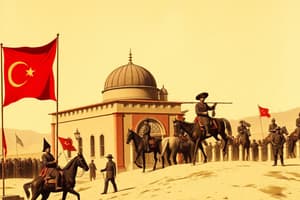Podcast
Questions and Answers
When did the first World War begin?
When did the first World War begin?
- July 4th, 1922
- September 1st, 1939
- June 28th, 1914 (correct)
- November 11th, 1918
Which event significantly shifted the balance towards victory for the Allies during World War I?
Which event significantly shifted the balance towards victory for the Allies during World War I?
- Signing of the Treaty of Versailles
- The entry of America into the war (correct)
- World War II unfolding across continents
- Germany accepting responsibility for starting the war
Which countries were part of the Triple Entente during World War I?
Which countries were part of the Triple Entente during World War I?
- Germany, Austria-Hungary, and Italy
- France, Russia, and Britain (correct)
- United States, Japan, and Australia
- Canada, New Zealand, and Germany
What event sparked the beginning of the second World War?
What event sparked the beginning of the second World War?
What was a key aspect of the Treaty of Versailles signed in 1919?
What was a key aspect of the Treaty of Versailles signed in 1919?
Which country remained neutral during both World War I and World War II?
Which country remained neutral during both World War I and World War II?
Which major powers primarily made up the Central Powers in World War I?
Which major powers primarily made up the Central Powers in World War I?
When did India become independent from Britain?
When did India become independent from Britain?
What were some of the outcomes of the World Wars beyond wartime itself?
What were some of the outcomes of the World Wars beyond wartime itself?
Which international organizations were established in the aftermath of World War II to prevent future conflicts?
Which international organizations were established in the aftermath of World War II to prevent future conflicts?
Flashcards are hidden until you start studying
Study Notes
Unraveling History's Twists: A Brief Overview of World Wars
Throughout human history, few events have shaped our collective narrative quite like the two conflicts known as the World Wars—conflicts that enveloped nearly every corner of the globe, altered political landscapes, and redefined the very concepts of warfare. As we delve into this pivotal period of modern times, let us trace the key moments and far-reaching consequences of these monumental world events.
Origins and Timeline
The first World War began with the assassination of Archduke Franz Ferdinand of Austria-Hungary in Sarajevo on June 28th, 1914. This act sparked a series of interconnected conflicts between great powers, ultimately leading to widespread devastation by its conclusion in November 1918. The second World War commenced with Germany invading Poland on September 1st, 1939, following years of military expansionism and territorial aggression amid a global depression. With both wars stretching over several years, their impacts extended well beyond wartime itself.
WWI: Key Conflicts and Consequences
World War I saw Europe's major powers draw together into opposing coalitions—the Triple Entente consisting of France, Russia, and Britain; and the Central Powers comprising primarily Germany and Austria-Hungary. Influential actors such as the United States, Canada, Australia, New Zealand, Japan, and Italy also joined various sides throughout the conflict. Despite initial hopes for a swift resolution, trench warfare prolonged hostilities until 1917 when America entered the fray, tipping the balance towards victory for the Allies. The Treaty of Versailles, signed in 1919, forced Germany to accept responsibility for starting the war and imposed severe penalties upon it, including significant territorial losses and large-scale reparations payments.
WWII: Global Scale and Enduring Legacy
Unlike WWI, which was largely confined to European battlefields, World War II unfolded across continents and oceans. It began as retaliatory skirmishes against German belligerence, expanding rapidly through the invasion of neighboring countries and eventual acts of aggression perpetrated by the Nazi regime. Major alliances formed during WWI remained intact, while new entities joined the fight, particularly the Soviet Union (from 1941), China (from 1941), Brazil (from 1942), India (independent from Britain in 1947), and other Commonwealth nations. World War II ended with the unconditional surrender of Germany and Japan in May and September 1945 respectively. Its aftermath brought forth international organizations, such as the UN and NATO, aimed at preventing future conflagrations.
In summary, the World Wars served as epicenter points for much of the twentieth century's most formidable challenges. These conflicts fundamentally transformed geopolitical relationships, reshaped economic structures, and profoundly influenced societies around the globe—impactful legacies far exceeding the boundaries of armed combat.
Studying That Suits You
Use AI to generate personalized quizzes and flashcards to suit your learning preferences.




